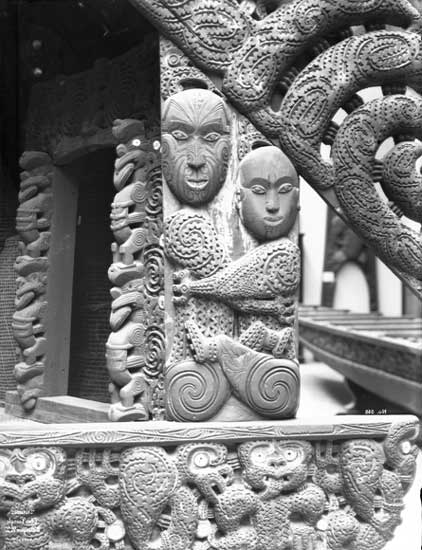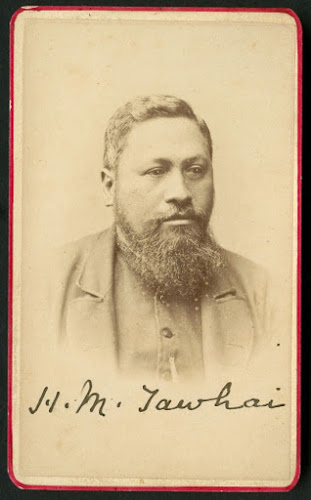Uncle Toms and Kupapas: ‘Collaboration’ versus Alliance in a New Zealand Context
Later this year I will be attending a conference at the University of Bern, Switzerland, on the theme of 'Cooperation under the Premise of Imperialism'. Many of the papers to be presented at the conference will be exploring the role of indigenous agents in imperialism throughout Africa and Asia. In my case, I will be discussing the role of kupapa in New Zealand history. I hope to write more about this later on, but meanwhile, by way of providing some insight into my main arguments, what follows is the abstract to my paper.
+++++++++
The term ‘collaboration’, used in its
historical sense, carries unquestionably pejorative connotations. One thinks
immediately of those who collaborated with the Nazi regime during the Second
World War. Depending on one’s cultural context, the Campbell’s role at Glencoe might also come to
mind, or any number of other examples of groups seen as acting in a manner
contrary to the national interest.
In the New Zealand context, the label is
one applied to those Maori tribes (iwi) who fought on the British side during
the New Zealand Wars of 1844-1872. Here, too, the term has negative
connotations. In fact, although the act of fighting on the British side against
other Maori considered rebels is often described as a form of collaboration,
the tribes and individual chiefs concerned are hardly ever called ‘collaborators’.
Most commonly, they are simply termed ‘loyalists’, with or without quotation
marks.
Such terminology can be seen as reflecting the
historical usage of this word (alongside phrases such as ‘friendlies’) in the nineteenth
century; but its use can perhaps partly also be attributed to the realisation
that the branding of Maori as ‘collaborators’ by historians and other scholars would
be highly controversial. In fact, however, the stigmatisation of such groups
within Maori society itself is well known. It is common to hear of Maori today
who are too ‘whakama’ (ashamed) to name their tribe for fear of being labelled
as ‘Uncle Toms’ (or worse). ‘Kupapa’, the usual Maori word for those who fought
alongside government forces, is a widely employed contemporary term of abuse,
used to describe politicians and others considered guilty of selling out or
betraying their people.
This need not be the case. Those Maori
tribes who fought on the Crown side during the wars fought alongside the Crown rather than for
it. The distinction is one of more than mere semantics. They fought to
pursue their own tribal imperatives, rather than simply those of the Crown.
That being the case, it is misleading to describe their actions as a form of ‘collaboration’,
with all of the cultural baggage that this terminology brings. A better description
would be alliance. For these tribes were very much allies of the Crown rather
than soldiers fighting for it. They had their own battles to fight and their
own motives for fighting them. These motives included settling old scores with
other tribes, preventing the confiscation of their lands by the Crown, securing
payment and reward for their services, enhancing the mana (prestige or status) of
their tribe through victory, and in some circumstances pure self defence. One
thing such groups were not is passive tools of the Crown. A considerable degree
of Maori agency was evident throughout the New Zealand Wars.
‘Loyalty’ in
practice was much more than a one-dimensional cardboard cut-out notion of blind
adherence to the Crown. Indeed, at a fundamental level the aspirations of
tribes considered loyalists were little different from those of the iwi they
fought against. All of the tribes — whether ‘loyal’ or ‘rebel’ — sought to
retain land and mana. The difference was that some chose to try and achieve
these goals in alliance with the Crown. The decisions and actions of such
groups in the mid-nineteenth century reveal much about the persistence of a Maori
worldview throughout the colonial era. And those notions of an alliance with
the Crown carried through into the twentieth century, when the most ‘loyal’
tribes were at the forefront of substantial Maori involvement in the two world
wars — even as other iwi who had suffered invasion and land confiscations made
clear their ongoing bitterness at such brutal treatment by refusing to serve in
the armed forces of the same Crown that had caused them so much misery.
Whether the strategy of alliance paid
dividends for those groups who opted for such a path is, however, a moot point.
Though one historian has suggested that Kupapa Maori communities ‘mostly
prospered’ in the wake of the wars, the evidence suggests altogether more
limited gains. Loyalist tribes soon found themselves under pressure to sell
their lands to the government as further evidence of their ongoing allegiance
to the Crown, for example, and themselves suffered land confiscation and significant
socio-economic disruption notwithstanding their alliances with the government.
A direct comparison with former ‘rebel’ Maori tribes points to little real
difference in outcomes over the long-term, even if iwi deemed loyal were able
to extract some small concessions, such as the creation of dedicated Maori
seats in Parliament, during the period when the Crown became most reliant on
their military and logistical support.
In summary, this paper will argue that the
notion of collaboration is not only an inaccurate one in a New Zealand
context. It is also a deeply Eurocentric concept, implying as it does that
Maori actions in the mid-nineteenth century were entirely governed by and
revolved around an imperial presence, rather than reflecting older and
pre-existing tribal imperatives. Some Maori communities opted to ally
themselves with the Crown out of a range of motives, few of which had anything
to do with whether they supported the imperial project. Ultimately Kupapa groups
fared little better than those tribes they fought against, whose own goals and
objectives were often surprisingly similar. Recognition of these realities can
contribute not only to a more nuanced understanding of the nature of indigenous
responses to imperialism, but at a practical level can also assist to lift the
stigma sometimes still unfairly attached to iwi considered Kupapa.



Comments
Post a Comment